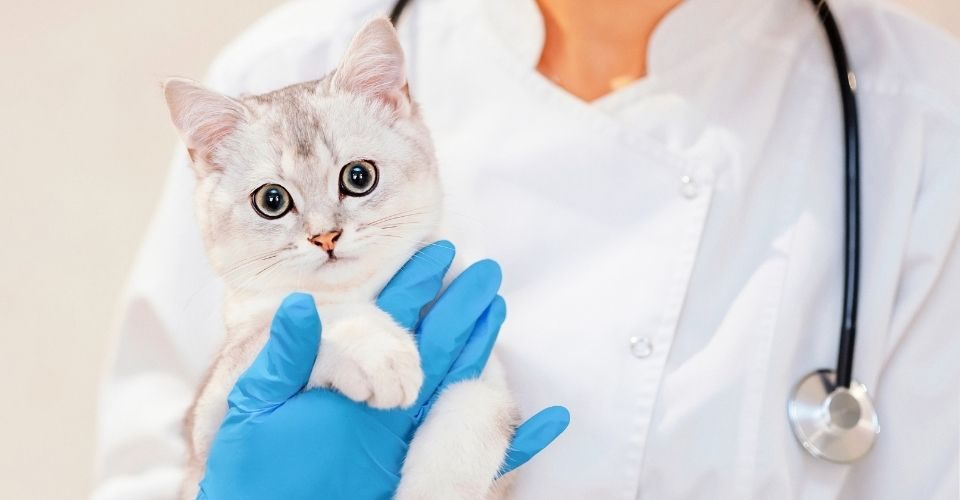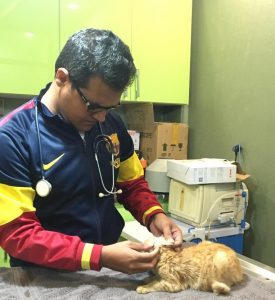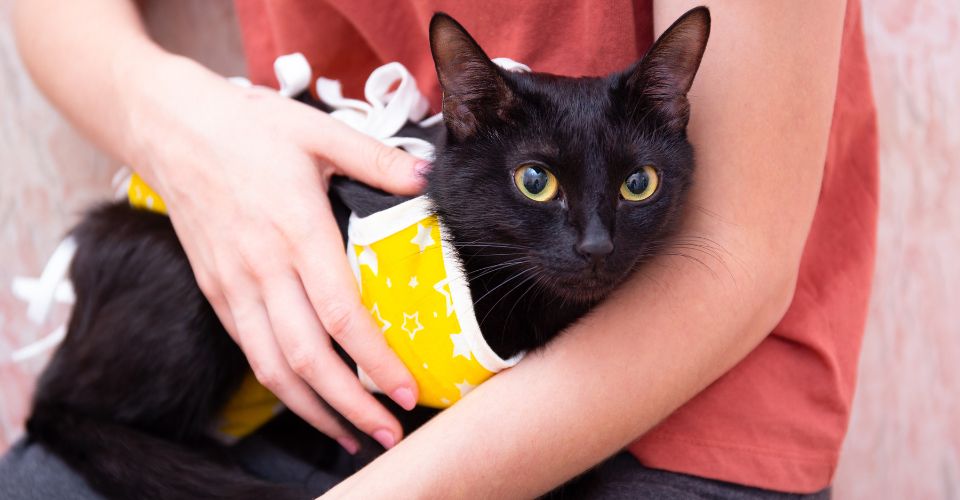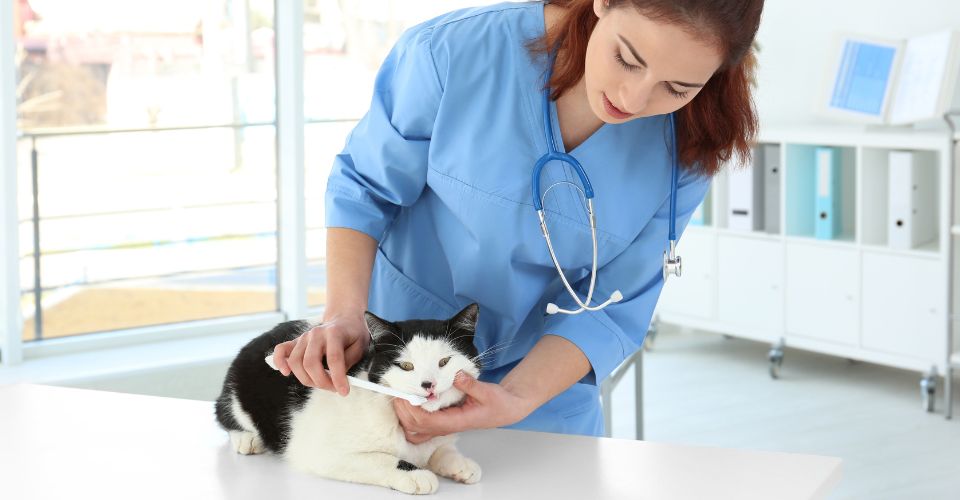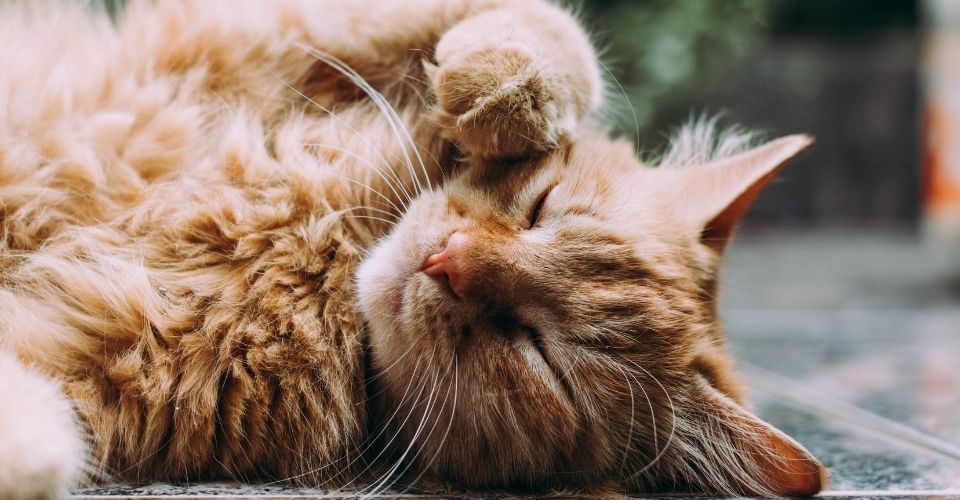Vet visits are a huge hassle both for cat owners and their cats. The whole process of putting your cat in the carrier, driving to the vet clinic with your cat hissing and growling, looking for a parking space, entering the clinic packed with unfamiliar cats and dogs, and the endless waiting riles up your cat. This may make you wonder how often do you take a cat to the vet.
A short answer is: you should take your cat to the vet once every year. As per the American Animal Hospital Association, all pets should be taken to the vet for wellness checkups at least once a year. This is when your cat does not appear to have a health condition. The frequency of vet visits may vary if the cat has a pre-existing health condition.
Do Cats Need Regular Vet Visits? Busting the Myth
There is a widely believed myth that cats do not require regular vet checkups, unlike dogs. It is wrongly assumed that until cats are regularly fed, they do not need a vet checkup.
Actually, cats are stoic creatures. They hide their signs of sickness until it becomes impossible for them to conceal. This is the reason that even the most responsible and caring parents fail to identify that there is something wrong with their cat. However, caring parents familiarize themselves with subtle signs a cat is sick to identify if their cat is sick.
Due to cats’ stoic nature, it becomes imperative that you never skip a regular vet checkup of your fluff ball. Vet visits are essential to rule out the possibility of your cat developing any serious illness.
When To Take Your Cat to the Vet
Knowing that vet visits may be a pain for both cats and cat owners, one may decide to first look for signs. Depending on the condition of your cat, different questions may pop up in your head.
Should I take my cat to the vet for a cold? When to take a sneezing cat to the vet? Should I take my cat to the vet for fleas? Should I take my cat to the vet for vomiting?
Should I Take My Cat to the Vet for a Cold?
As with humans, cat colds are harmless and nothing to worry about. Anyway, there is nothing much a doctor can do about it. You need not rush to the vet for a common cold, as motion stress may worsen it. Therefore, you should wait a few days to check if your cat’s health is improving.
If the health of your feline fellow is improving and she starts eating and drinking like earlier, you should let the cold run its natural course. Usually, symptoms of a cold disappear in a week or two.
However, if your fluff ball is not getting better with time, and you can sense that the kitty is experiencing trouble breathing, you should take her to the vet immediately.
When To Take a Sneezing Cat to the Vet?
Sneezing is a normal and quite useful bodily function. Sneezing is cats’ way of forcefully expelling irritants from their nose. There might be nothing to worry about if you have noticed your cat sneezing. She might just be trying to expel some irritants from her nose.
However, if sneezing is persistent and your cat is exhibiting some other symptoms as well, you should take your cat to the veterinarian. Sneezing might be a cause of some serious underlying cat diseases, such as feline upper respiratory infection(hyperlink upper respiratory infection in cats), bacterial infections, dental issues, and inflammatory conditions.
Should I Take My Cat to the Vet for Fleas?
Well, you might not have to take your cat to the vet for fleas, but you cannot ignore it either. Fleas are much more than merely a nuisance—they multiply and make your cat itch and scratch excessively. To rid your cat of fleas, you will have to remove fleas from your cat’s coat and from your house and other pets in the house. Instead of taking your cat to the vet, you can simply ask your vet to prescribe a treatment considering your cat’s history. The vet may suggest an anti-flea shampoo or a spray rid your cat of fleas.
When to Take a Vomiting Cat to the Vet?
It depends on what your cat is throwing out. If the kitty has been expelling a hairball, this is alright. Cats vomit hairballs periodically. But if there is frequent vomiting and your cat seems to be throwing up everything she eats or drinks, you should take her to the vet right away. Severe vomiting might require an aggressive treatment involving blood tests, x-rays, endoscopy, laparotomy, ultrasound, etc.
While it is good to look for subtle signs of sickness that may tip you off that you need to take your cat to the vet, you should never miss a vet visit just to save a few bucks. Always remember that cats are stoic creatures, concealing their sickness and vulnerabilities from others.
How Often Do You Take a Cat to the Vet?
As a responsible and caring cat parent, you probably know that taking your cat for a regular vet checkup is one of the most important things you can do for your fluff ball. But how regular? How often do you take your cat to the vet? Are annual checkups enough? Or do you need to take your cat to the vet twice a year?
Well, there is no one-size-fits-all answer here. Your cat’s age, environment, and pre-existing health conditions will determine the answer to “how often should you take your cat to the vet?”
Often, cat owners fail to make a correct estimate about the development stages of their cats and, therefore, cannot provide the required care to their cats. For this reason, cat owners are advised to maintain a kitten growth chart to track the developmental changes that their kittens are going through.
Similarly, many cat parents are confused about how much and how frequently their cats should eat. Given the epidemic of obesity in the feline world—more than 50 percent of the cats brought to vet clinics are overweight, if not obese—cat owners often get worried about their cats eating all the time.
If you are perplexed by the eating routine f your cat, take a look at the kitten feeding chart to know how much and how frequently you should be feeding your cat.
How Often Do You Take a Kitten to the Vet?
Your vet would be better able to answer this question. Depending on your kitten’s health, your vet will provide you with a schedule for vaccination and regular health checkups. Due to obvious reasons, kittens will have to see their vets more often than adult cats. You might have to take your kitten to the vet five to six times during the first year.
During these visits, your kitten will get a series of vaccinations that will immunize her against a series of deadly feline diseases. During each visit, your feline partner will also be examined from head to tail, ruling out the possibility of any serious sickness.
By the end of the first year, you will also have to take your cat to the vet for spaying and neutering. You should neuter your cat before they hit puberty. Depending on your cat’s breed, your vet will suggest the optimal age for your cat to be neutered. Fixing your cat will keep her from engaging in unwanted behaviors like fights with other pets and marking territories by spaying and will also reduce the risk of many serious diseases.
When Should You Take Your New Kitten for the First Vet Checkup?
There is no defined stage for a kitten’s first vet visit, but it is advised that you take your newborn kitten to the vet as soon as possible. He or she will thoroughly examine your kitten to suggest a proper care plan depending on your kitten’s overall health.
If you have adopted a kitten from a cat shelter or have rescued a stray kitten, you must take her straight to the vet before bringing her home, especially if you have other pets at home. Many shelter regulators often bind new owners to make their kitten’s first vet appointment at their earliest.
Due to some unforeseen reasons, if you cannot take your new cat to the vet before bringing her home, you must quarantine her. The newly arrived cat must be given a separate litter box and bowls. This will decrease the risk of the spread of diseases if the new cat has any.
Is Your Kitten Scared of the Vet?
During the frequent visits of the first year, your cat will build a rapport with the vet. It is advised that you do not change vets as seeing an unfamiliar face may get her scared. Cats scared of the vet might not allow the vet to examine them easily. You can avoid this by giving your cat a treat on the way to the vet and one after the visit. This way, vet visits will be associated with fun times.
How Often Do You Take an Adult Cat to the Vet?
Depending on your cat’s overall health and lifestyle, your vet will determine how often your need to bring her in. One visit each year is the usual practice for healthy adult cats. Over-concerned cat parents may take their cats to the vet for checkups twice a year. If your cat has any medical condition, you might have to take her to the vet clinic more often. Different vaccine boosters, like one for rabies, will continue as your cat enters adulthood.
How Often Do Outdoor Cats Need to Go to the Vet?
Compared to indoor cats, outdoor cats need more frequent vet visits. According to WebMD, where indoor cats have an average lifespan of 17 years, outdoor cats live around 2 to 4 years. This is because outdoor cats are at a greater risk of catching infectious diseases like feline leukemia, feline AIDS, and respiratory infections.
This means that if you have recently brought an outdoor adult cat home, she might need more frequent visits than her indoor counterparts.
How Often Do You Take a Senior Cat to the Vet?
In their senior years, cats have very little immunity and are at a huge risk of developing numerous health issues, such as kidney issues, diabetes, arthritis, dental issues, hyperthyroidism, etc. This is the reason that you will have to take your senior cats to the vet more often. Your vet might suggest some comprehensive treatment or care plan for your senior cat, depending on your cat’s health.
How Take Your Cat to the Vet?
Taking a cat to the vet is quite a hassle—not only for cat owners but also for their cats. Oftentimes cats get anxious and distressed during their journey to the vet, which causes many people to question how to take a cat to the vet.
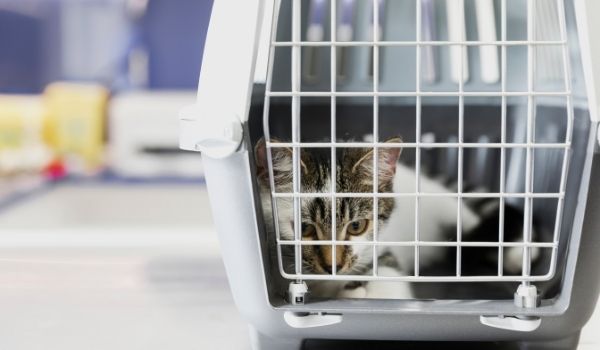
Taking a cat to the vet is undoubtedly a stressful activity, but you can make your cat’s trip to the vet less stressful—maybe enjoyable. Here’s how:
- Use a cat carrier: This carrier should be of the right size—having ample space for your cat to move around. It should be cozy ad free of any bad smells.
- Put your cat in the carrier and take her on test drives—small rides across the street. Maybe, bring along her favorite toy.
- Once your cat seems comfortable, you should take her for a vet visit. Maybe, give her a treat at the beginning of the journey.
- Once at the vet clinic, cover the cat carrier with a towel and do not let your cat out until it is necessary—to clean your cat.
- Carefully take her out of the carrier on the directions of the vet.
- After the checkup, you should put your cat back in the carrier and maybe give her a small treat as well. If your cat seems anxious, you can cover her carrier on the way out of the clinic.
- After getting home, you should give your cat her favorite treat. This will help to associate vet visits with a happy and fun activity.
How to Take a Stray Cat to the Vet
Have you spotted an injured or sick cat in the neighborhood or while driving on the roadside? If it is in the neighborhood, you should borrow a cat trap from ASPCA. You can also ask them for advice about how to deal with a stray cat.
You would have to place some bait—treat for cats—in the cage. As the cat enters the cage to get the treat, the door will close behind. Once trapped, you can easily take the cat to the vet. The vet will first look if the cat is chipped; if they can find a chip, you will be able to get the cat to her rightful owners. But if no chip is found—the cat is feral, you should ask the vet for advice. He may suggest you take the cat to the nearby cat shelter if you are not ready to take her in.
How Often Do Cats Need Vaccines?
Vaccination is crucial to keep once commonly deadly feline infectious diseases at bay. While many people may like to think that getting their cats vaccinated once would make them immune to deadly infectious diseases for life, unfortunately, it is not the case—cats need booster shots regularly.
Abstaining from these booster shots puts your cat at risk of contracting infectious diseases. According to research, where some viral vaccines induce immunity for around three years, our cats usually require annual boosters for bacterial vaccines.
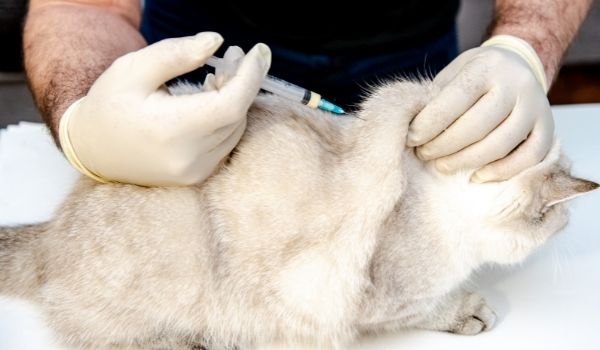
According to the American Association of Feline Practitioners (AAFP), cats with a healthy immune system should receive core vaccines every three years and for non-core vaccines, the vet’s advice should be taken.
If your cat is an indoor cat and never goes out, then you probably do not need frequent vaccination shots. However, if your cat is an outdoor cat or often goes outside and interacts with other cats, you should be very careful about her vaccination, as outdoor or outgoing cats are at a higher risk.
I Never Take My Cat to the Vet
We all have a friend who takes pride in never taking their cat to the vet. They argue that as far as cats are getting a balanced diet, there is no need for a vet visit, especially if their cat is purely indoors and never goes out. There may seem to be some level of rationale in their arguments but believe us when we say that not taking your cat to the vet is never a good decision.
To begin with, it is compulsory to vaccinate cats, whether they are indoor cats or otherwise. Secondly, cats are stoic creatures; they hide their signs of sickness, and even responsible cat owners fail to identify that their cats have been sick. They only realize it when it’s too late. Therefore, better safe than sorry—take your cat for regular vet checkups to rule out the possibility of your cat developing any serious diseases.
When to Take Cat to Emergency Vet?
There is nothing more excruciating than seeing your feline friend in pain. If you just noticed that there is something wrong with your cat, instead of panicking, you should immediately take the cat to the emergency vet.
- If your cat was in a car accident, you should wrap a blanket around her and immediately rush to the emergency vet.
- If your cat has been hiding more than usual. Cats seek solace when they are in pain or their time is near.
- If your cat is experiencing difficulty breathing and has been panting like a dog, and has a high respiratory rate.
- Excessive vomiting and drooling.
- Food poisoning. Without waiting for your cat to exhibit the signs of poisoning, you should rush to the emergency vet if your cat has eaten anything toxic to them, i.e., chocolate, onion, garlic, bleach, and laundry detergent. You may call Pet Poison Helpline.
- Frequent vomiting and visits to the litter box
- Little to no eating for 2 to 3 days
So, how often do you take a cat to the vet? As the preceding discussion shows, there is no standard answer available. Much depends on your cat’s age, activity levels, breed, and medical history. However, it is advised that you never miss an annual vet visit.

